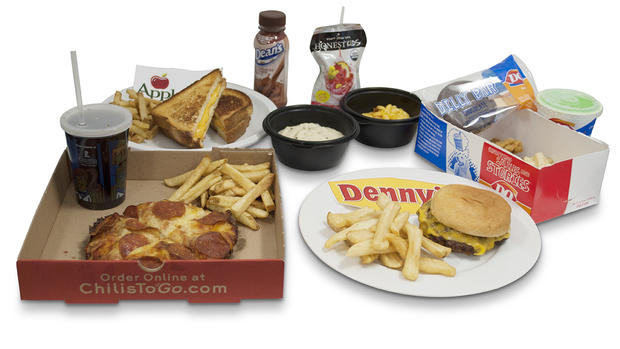Long John Silver's Big Catch named "Worst Meal in America"
Coming in at a whopping 1,320 calories, and with more trans fats than you should eat in two weeks, Long John Silver's Big Catch has been declared the "Worst Restaurant Meal in America" by the Center for Science in the Public Interest (CSPI).
The non-profit organization that advocates for nutrition and health tested the popular fast-food restaurant meal, and found Long John Silver's offering to be the worst offender that they have encountered.
In addition to high caloric content, it had 19 grams of saturated fat, almost 3,700 milligrams of sodium and 33 grams of trans fats. The meal includes fried fish, hush puppies and a side of onion rings.
"Long John Silver's Big Catch meal deserves to be buried 20,000 leagues under the sea," CSPI executive director Michael F. Jacobson said in a press release. "This company is taking perfectly healthy fish -- and entombing it in a thick crust of batter and partially hydrogenated oil. The result? A heart attack on a hook. Instead of the Big Catch, I'd call it America's Deadliest Catch."
The deceptively "healthy" fish may also throw off consumers. Long John Silver's website claims the haddock offered in the meal is 7 to 8 ounces of 100 percent fish. However, once CSPI pulled off the batter, they discovered the fish part was actually just 4.5 ounces and the fried part was 3 ounces of trans fats.
"It's more like 60 percent haddock, and 40 percent batter and grease," Jacobson said. "Nutrition aside, that's just plain piracy."
Other lab tests revealed that the meal's other components had much higher trans fats than the company's nutritional information listed. The onion rings were listed at 7 grams of trans fat, but CSPI's test revealed they had 19.5 grams of trans fat.
Saturated fat has been linked to chronic disease including coronary heart disease, and the 2010 Dietary Guidelines for Americans recommend that less than 10 percent of daily calories come from this source.
Sodium or salt content has been linked to high blood pressure.
While the average daily sodium intake for Americans 2 and older is more than 3,400 mg according to the Centers for Disease Control and Prevention, the 2010 Dietary Guidelines suggest restricting sodium content to less than 2,300 mg for adults and 1,500 mg for those 51 and older, children, African Americans and those with high blood pressure, diabetes or chronic kidney disease. However, a May report from Institute of Medicine (IOM) suggests that lowering sodium below 2,300 milligrams per day may be harmful to people's health.
The trans fats might be the worst part of the meal. The meal is cooked in partially hydrogenated frying oil, which packs on the trans fat. The American Heart Association recommends that people eat no more than about 2 grams of trans fats a day.
"Trans fat from partially hydrogenated oil is a uniquely damaging substance that raises your bad cholesterol, lowers your good cholesterol, and harms the cells that line your blood vessels," Walter C. Willett, chair of the nutrition department at the Harvard School of Public Health, said in a press release. "It might have been defensible to use hydrogenated oil in the 1980s, before trans fat's harmfulness was discovered, but no longer. It is outrageous that Long John Silver's foods are still loaded with artificial trans fat and that the FDA still permits it in foods."
- Sodium levels in packaged and restaurant foods have not fallen much, study finds
- Consumer group: Majority of restaurant kids' meals fail to make nutritional cut
- Eating out? Beware of these Xtreme restaurant foods, watchdog warns
CSPI notified the Food and Drug Administration of their findings and notified Long John Silver's CEO Mike Kern that the company will be sued if they continue to list the wrong nutritional information, say the meals contain more fish than they actually do and use partially hydrogenated oil.
Baylen Linnekin, executive director of a Washington nonprofit called Keep Food Legal, told AFP that the potential lawsuit was "outrageous."
"I am very much in favor of groups like CSPI," said Linnekin, a lawyer who advocates for "food freedom," explained. "Where I tend to depart from their actions is when they threaten to sue. It is one thing to put out information and to rail against too many calories or trans fats or what-not. It is an entirely different thing to sue a company."
